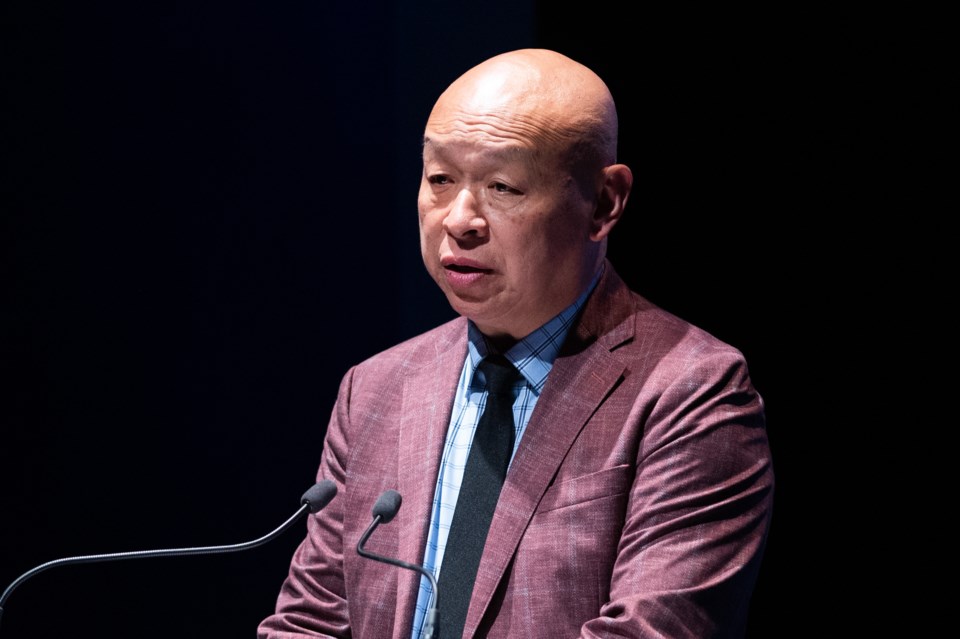Liberal Leader Mark Carney stood by his Markham—Unionville candidate Paul Chiang yesterday, calling his comments about turning over another candidate to the Chinese consulate — and his subsequent apology — a “teachable moment.”
On Friday, the rookie MP admitted to making “deplorable” comments in January while at a Chinese media conference, telling the audience to turn in CPC Don Valley North candidate Joe Tay to the Chinese consulate in Toronto to collect a bounty on him. Hong Kong police had a bounty out for Tay’s arrest over alleged violations of a national security law in Beijing.
At a campaign stop in Vaughan, Carney sought to turn the page on the “deeply offensive” comments, noting Chiang has since apologized to Tay directly. But he was dogged by questions about Chiang’s fitness to represent a diverse riding home to a significant Chinese diaspora.
Carney said he spoke to Chiang over the weekend, describing the former policeman as a "person of integrity” who has his “confidence” to stay within the Liberal fold.
When pressed about mounting calls not just from the CPC, but civil society groups for the Liberals to ditch Chiang as a candidate, he stood firm.
“I am deeply offended by those comments. As I said, they (showed) a terrible lapse of judgment. I view this as a teachable moment,” Carney said. “It underscores the respect with which we treat human rights in this country, the difference between Canadian society and other countries."
In a late Sunday statement, Chiang said he’s disappointed in himself and extended his apology to Tay, promising to never make similar comments in the future. But in a statement of his own on Monday, Tay said an apology is not enough, and Carney must boot Chiang as a candidate.
“Threats like these are the tradecraft of the Chinese Communist Party to interfere in Canada. And they are not just aimed at me,” Tay wrote. “They are intended to send a chilling signal to the entire community in order to force compliance to Beijing's political goals.”
He added he feared for his safety and, even before Chiang’s comments, had been in talks with the RCMP about his “personal protection.”
Experts flag impact on community members
The comments came just before officials with the Security and Intelligence Threats to Election (SITE) task force held a media briefing.
Privy Council Office (PCO) assistant secretary to cabinet communications and consultations Laurie-Anne Kempton confirmed her team was “aware” of the case, and while she noted that Ottawa has condemned Hong Kong’s use of bounties as a tool to silence dissidents abroad, she said Chiang’s remarks do not fall under the mandate of the task force.
Larisa Galadza, director general of Global Affairs Canada’s cyber bureau, said it remains unclear whether China is the source of efforts to boost an online campaign drawing attention to bounties.
“What we saw was news of the bounty was re-upped,” she explained. “That alone I think is a form of coercion — spreading again the information about the bounty is precisely how maligned foreign states seek to silence, harass and coerce.”
Meanwhile, Hong Kong Watch policy advisor Katherine Leung said Chiang’s “unthinkable” comments raise questions about whether elected officials are taking foreign meddling efforts seriously.
Leung told Hill reporters that Ottawa should adopt a “zero tolerance approach” to such comments, warning politicians against making partisan hay of the issue, adding Hay’s treatment sends a chilling message to community members who may now feel unsafe speaking out against adversarial nations.
She said she expected more from Chiang, as he was likely briefed on these issues as parliamentary secretary to the immigration minister in the last government.
Chiang held that role from 2023 up until Parliament’s dissolution last month.
NDP Leader Jagmeet Singh echoed Leung's point, saying Chiang’s remarks are especially “scary” for immigrants who came to Canada to flee oppressive governments. He said Carney allowing Chiang to stand as a candidate shows the former thinks such comments are above board and that diaspora community members are “less important” to him than his party’s interests.
Uyghur Rights Advocacy Project executive director Mehmet Tohti appeared to go further, arguing Chiang’s continued candidacy is "unacceptable" and the case could impact how safe Uyghur Canadians feel with him in Parliament.
“Either he should resign or the Liberal Party should handle his situation as soon as possible,” Tohti said.
Questions remain
RCMP director general of federal policing security intelligence Greg O’Hayon was unable to say whether the force is speaking with Tay, but said any candidate feeling threatened should reach out to CSIS or police within their jurisdiction to ensure a “combined response.” Noting the RCMP’s protective mandate covers the prime minister and leaders of recognized parties in the House, he acknowledged that’s because the force “cannot be everywhere all at once.”
Kempton pointed to Public Safety Canada’s launch of a candidate security program this year that allows wanna-be politicians access to “unarmed private sector security services” to thwart intimidation efforts. That’s available in cases that don’t meet the “threshold to warrant” RCMP or local police protection.
Allen Sutherland, assistant secretary to cabinet who focuses on democratic institutions, said this program can be used by candidates of all parties for things like campaign events and “personal threats,” but cautioned it’s part of a "layered" approach. Officials confirmed this program is separate from Elections Canada’s fund to help returning officers cover security costs, which is capped at $5,000.
Meanwhile, Carney told Vaughan reporters he received a briefing on foreign interference “and potential matters related to that" from officials on Sunday night, but declined to elaborate. Asked about that, Sutherland said designated party reps got a classified security briefing about election threats “late last week,” but stopped short of specifics




